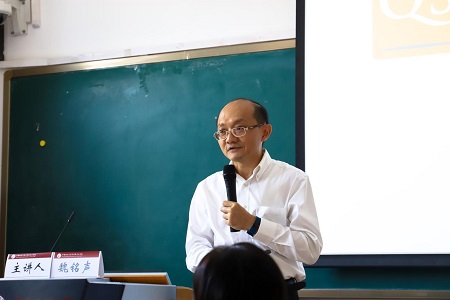WEE MENG SENG ON SUCCEEDING IN CORPORATE AND INSOLVENCY LAW
It’s not as simple as knowing the laws, says the Head (Corporate Law) of the EW Barker Centre for Law & Business at the NUS Faculty of Law.

Having taught company law and corporate insolvency law for some 15 years, Associate Professor Wee Meng Seng is adept at simplifying complicated concepts and making them accessible, even for laypeople. This trait comes in handy as we discuss the practice area’s new “omnibus legislation”: the Insolvency, Restructuring and Dissolution Act 2018 (IRDA), which has been the culmination of several years of significant legislative trends. Since coming into force at the end of July, the IRDA has brought together Singapore’s personal bankruptcy and corporate insolvency laws into one Act.
A/Prof Wee welcomes the move, noting that it will benefit the industry by providing more “coherence, consistency and clarity”. “When you had these laws in different Acts, you could be prone to blind spots,” he explains. “You might miss things that you may have caught had you seen the laws side-by-side.”
And while practitioners won’t have to “un-learn” very much, they will definitely have to learn and understand the new law’s technical provisions. To help them along, practitioners can join a webinar next month at which A/Prof Wee will be speaking. The Head (Corporate Law) of the EW Barker Centre for Law & Business at the NUS Faculty of Law shares that the session will especially focus on the continuity and change brought on by the IRDA.
TAKING ON INSOLVENT TRADING
These changes include new provisions like out-of-court judicial management, which his co-presenter Ms Debby Lim of BlackOak discussed in a previous interview with SAL. Another new provision is a wrongful trading clause that updates longstanding insolvent trading legislation. Under the old law, civil liability for the practice of insolvent trading was tied closely to a criminal conviction, making it difficult to enforce.
The updated legislation aims to change this by characterising wrongful trading as the incursion of debts or liabilities by insolvent companies that would be unlikely to meet them. While welcoming the revised provision, A/Prof Wee notes that other jurisdictions have struggled to tackle the issue. “So we can’t assume that ours will hit the mark right away,” he explains. “We have to allow time for the law to develop, maybe five to 10 years.”
KEYS TO SUCCESS
It may seem fairly obvious, but for corporate lawyers to succeed, they should possess a sharp understanding of commerce and finance, says A/Prof Wee. That doesn’t mean mere numeracy—what’s more important is understanding what the numbers, be it in a balance sheet or transaction, are telling you.
Registrations for The Insolvency, Restructuring and Dissolution Act 2018 – Reforms and Continuity are now open. Besides Ms Lim and A/Prof Wee, attendees at next month’s webinar will also hear from other industry heavyweights, among them Ms Angela Ee, who leads Ernst & Young’s Turnaround and Restructuring Strategy practice in ASEAN; Mr Harold Foo, a Ministry of Law policymaker who worked on the IRDA, and Mr Sim Kwan Kiat, who heads Rajah & Tann’s restructuring and insolvency practice. Says A/Prof Wee, “It’s a holistic approach to understanding the legislation, by looking at its context, implications and possible evolution.”
A LIFE IN THE LAW
Associate Professor Wee Meng Seng is the Deputy Director and Head (Corporate Law) of the EW Barker Centre for Law & Business at the Faculty of Law, National University of Singapore (NUS), and an editorial member of the Singapore Journal of Legal Studies. He obtained his LLB from NUS, BCL (First Class) and DPhil from Oxford. He teaches corporate insolvency law and company law. He has published in journals including the SAcLJ, LQR, SJLS and the LMCLQ and chapters in Oxford University Press and Cambridge University Press books. His writings have been cited by fellow academics, the Singapore Court of Appeal and the Australian Federal Court. He was a member of the Insolvency Law Review Committee and was a visiting professor at various law schools.






